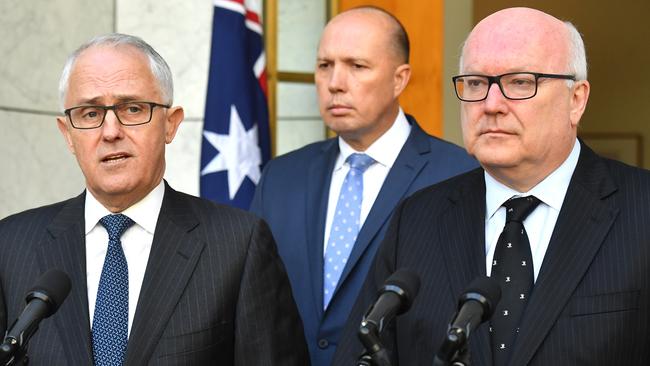Passports on the line as Abbott flags jihadist citizenship risk
THE Australian citizenship of dual nationals engaging in terrorism could be cancelled under new laws.
THE Australian citizenship of dual nationals engaging in terrorism could be cancelled under new laws being considered by the federal government as part of a major anti-terrorism package.
Tony Abbott yesterday flagged a crackdown on terrorists including tougher border security, residency, citizenship and welfare measures.
The Prime Minister will make a national security statement next Monday and is expected to release within days the government’s response to an inquiry into the handling of Sydney’s Lindt cafe siege in Martin Place in December.
Shortly after the siege, Mr Abbott and NSW Premier Mike Baird said the head of the Department of Prime Minister and Cabinet, Michael Thawley, and the head of the NSW Premier’s Department, Blair Comley, would hold an inquiry into why gunman Man Haron Monis was granted refugee status and citizenship, how he was given access to the welfare system and why he dropped off the security agencies’ watchlist.
One item being considered in the government’s latest national security response is a proposal by Coalition MP and newly appointed government whip Andrew Nikolic for Australia to follow moves in Britain, France and Canada towards suspending the citizenship of people involved in terrorism or revoking the citizenship of dual nationals.
Writing in The Australian today, Mr Nikolic calls for an “objective debate” on citizenship.
The Liberal MP also suggests strict control orders or denial of family reunion immigration for those who engage in terrorism and breach Australia’s laws.
Mr Nikolic said other countries’ determination to confront terrorism should signal a “pragmatic way ahead” for Australia. “Why is this important now? Because the issue of state citizenship — particularly that of dual nationals — will be an increasingly important battleground in the continuing ‘War on Terror’,” Mr Nikolic writes.
“At the very least, an objective public debate is needed on whether such a move is justified in Australia at this time.”
Mr Abbott, in announcing next week’s national security statement, said the federal and NSW governments were determined to learn the lessons of the Martin Place attack, which left two hostages and the gunman dead, “and will promptly take any necessary remedial action’’.
“It is clear to me that for too long we have given those who might be a threat to our country the benefit of the doubt,’’ Mr Abbott said. “There’s been the benefit of the doubt at our borders, the benefit of the doubt for residency, the benefit of the doubt for citizenship and the benefit of the doubt at Centrelink. And in the courts, there has been bail, when clearly there should have been jail.’’
Mr Abbott said Australia was a free and fair nation, “but that doesn’t mean we should let bad people play us for mugs, and all too often they have, but that’s going to stop’’.
He said the “rise of the Islamist death cult in the Middle East’’ — the Islamic State group that has declared a caliphate across parts of Syria and Iraq — had resulted in the emergence of new threats, “where any extremist can grab a knife, a flag, a camera phone and a victim and carry out a terror attack’’.
He said the government wanted to get its data-retention laws, which security agencies consider vital to combatting homegrown terrorism, passed as quickly as possible. Mr Nikolic said governments must be able to stigmatise those who participate in terrorism, identify those who persist in terrorist causes and, wherever possible, eject them from the state.
“Sources of terrorism in places like Iraq must be neutralised, including by use of military force if necessary,” he said.
“Closer to home and more benignly it can also be addressed by revoking citizenship, which I believe should be strongly supported in the case of dual nationals.”
The retired army brigadier conceded there were greater challenges for those who only hold one passport, saying the revocation of citizenship cannot render a person stateless. Mr Nikolic said Britain’s softer approach, to simply suspend citizenship, could be a more attractive option. “T hese issues, too, must be confronted as sensible democracies continue to grapple with, and ratchet up their responses to, those who seek to harm the state and its law-abiding citizens,” Mr Nikolic said.



To join the conversation, please log in. Don't have an account? Register
Join the conversation, you are commenting as Logout